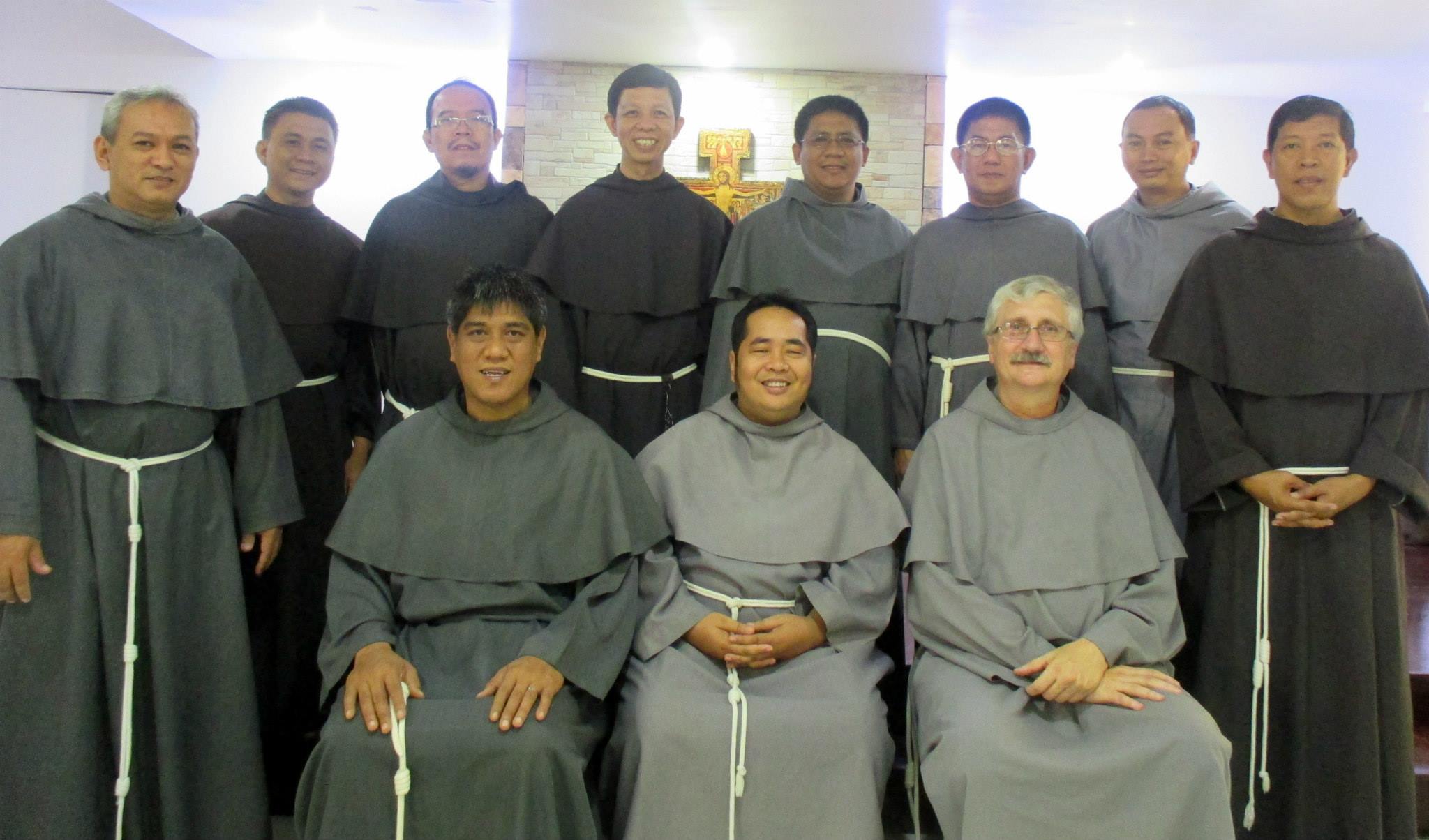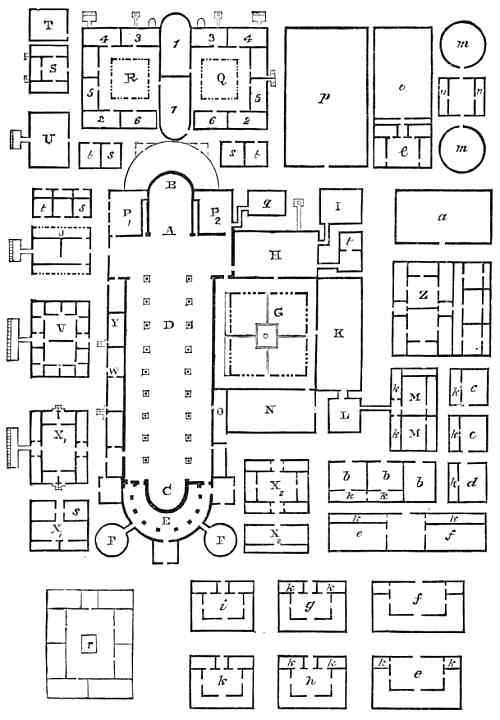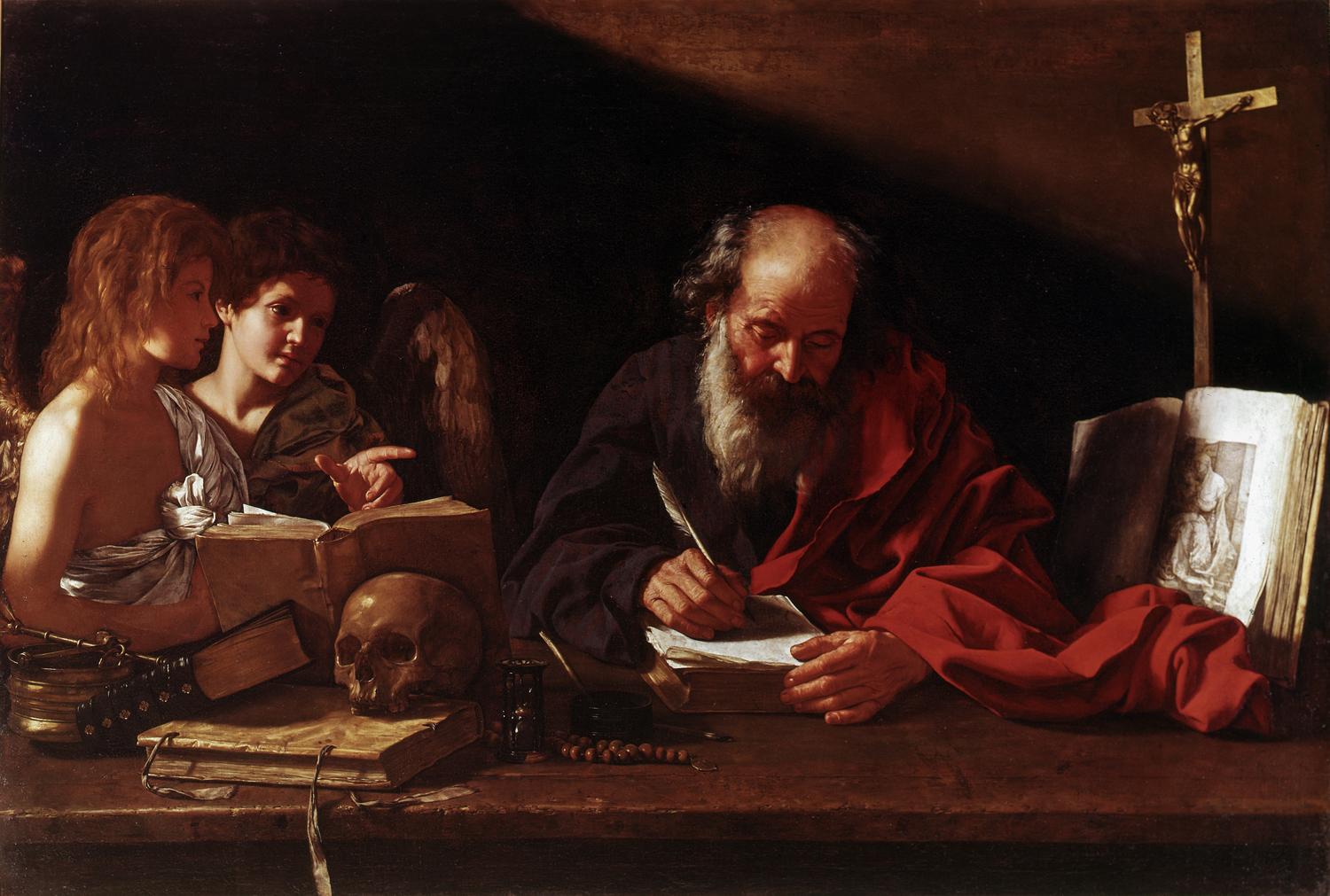|
Gyrovague
Gyrovagues (sometimes Gyrovagi or Gyruvagi or gyratory monks) were wandering or itinerant monks without fixed residence or leadership, who relied on charity and the hospitality of others. The term, coming from French , itself from Late Latin ''gyrovagus'' (''gyro-'', "circle" and ''vagus'', "wandering"), refers to a type of monk, rather than to a specific order, and may be pejorative as gyrovagues are almost universally denounced by Christian writers of the Early Middle Ages. The Council of Chalcedon (451) and Second Council of Nicaea (787) prohibit this practice. The "gyrovagi" were denounced as wretched by Benedict of Nursia (480 – 547), who accused them of indulging their passions and cravings. Augustine (354 – 430) called them (''circum cellas'' = those who prowl around the barns) and attributed the selling of fake relics as their innovation. Cassian ( 360 – 435) also mentions a class of monk, which may have been identical, who were reputed to be gluttons who re ... [...More Info...] [...Related Items...] OR: [Wikipedia] [Google] [Baidu] |
Sarabaites
__NOTOC__ Sarabaites were a kind of Christian monk widespread before the time of Benedict of Nursia. They were also known as ''remoboths''. History They either continued like the early asceticism, to live in their own homes, or dwelt together in or near cities. They acknowledged no monastic superior, obeyed no definite rule, and disposed individually of the product of their manual labour. Jerome speaks of them under the name remoboth, and John Cassian tells of their wide diffusion in Egypt and other lands. Both writers express a very unfavourable opinion concerning their conduct, and a reference to them in the ''Rule of Saint Benedict'' is of similar import. Philologists have attempted to discover Coptic terms behind the names. At a later date, the name Sarabaites designated in a general way degenerate monks. The Rule of St. Benedict considered their non-adherence to church canon only to be exceeded by the gyrovagues. References Works cited * See also * Gyrovagues * ''Rule ... [...More Info...] [...Related Items...] OR: [Wikipedia] [Google] [Baidu] |
Itinerant Minister
An itinerant preacher (also known as an itinerant minister) is a Christian evangelist who preaches the basic Christian redemption message while traveling around to different groups of people within a relatively short period of time. The usage of these travelling evangelists is known as itineracy or itinerancy. History Early first century New Testament figures such as John the Baptist, Jesus Christ and Apostle Paul were known for extensively traveling and preaching to unreached people groups in the Middle East and Europe, although often staying for longer periods than modern itinerant evangelists. In the Middle Ages, preachers from the mendicant orders such as Franciscans and Dominicans, would likewise travel from town to preach repentance or to combat heresy. Starting in the eighteenth century, the Methodists were known for sending out itinerant preachers known as circuit riders to share the message. The 'Itinerancy' is denoted as one of the "chief peculiar usages" of classic ... [...More Info...] [...Related Items...] OR: [Wikipedia] [Google] [Baidu] |
Rule Of St
Rule or ruling may refer to: Human activity * The exercise of political or personal control by someone with authority or power * Business rule, a rule pertaining to the structure or behavior internal to a business * School rule, a rule that is part of school discipline * Sport rule, a rule that defines how a sport is played * Game rule, a rule that defines how a game is played * Morality, a rule or element of a moral code for guiding choices in human behavior * Norm (philosophy), a kind of sentence or a reason to act, feel or believe * Social norm, explicit or implicit rules used within society or by a group * Rule of thumb, a principle with broad application that is not intended to be strictly accurate or reliable for every situation * Unspoken rule, an assumed rule of human behavior that is not voiced or written down Science * Ruler or "rule"; a distance measuring device * Slide rule, a mechanical analog computer * Rule of inference or transformation rule, a term in l ... [...More Info...] [...Related Items...] OR: [Wikipedia] [Google] [Baidu] |
The New Schaff-Herzog Encyclopedia Of Religious Knowledge
''The'' is a grammatical article in English, denoting nouns that are already or about to be mentioned, under discussion, implied or otherwise presumed familiar to listeners, readers, or speakers. It is the definite article in English. ''The'' is the most frequently used word in the English language; studies and analyses of texts have found it to account for seven percent of all printed English-language words. It is derived from gendered articles in Old English which combined in Middle English and now has a single form used with nouns of any gender. The word can be used with both singular and plural nouns, and with a noun that starts with any letter. This is different from many other languages, which have different forms of the definite article for different genders or numbers. Pronunciation In most dialects, "the" is pronounced as (with the voiced dental fricative followed by a schwa) when followed by a consonant sound, and as (homophone of the archaic pronoun '' the ... [...More Info...] [...Related Items...] OR: [Wikipedia] [Google] [Baidu] |
Mendicant Orders
Mendicant orders are primarily certain Catholic Church, Catholic religious orders that have vowed for their male members a lifestyle of vow of poverty, poverty, traveling, and living in urban areas for purposes of preacher, preaching, Evangelism, evangelization, and Christian ministry, ministry, especially to less wealthy individuals. At their foundation these orders rejected the previously established monasticism, monastic model, which prescribed living in one stable, isolated community where members worked at a trade and common ownership, owned property in common, including land, buildings and other wealth. By contrast, the mendicants avoided owning property, did not work at a trade, and embraced a poor, often wiktionary:itinerant, itinerant lifestyle. They depended for their survival on the goodwill of the people to whom they preached. The members of these orders are not called monks but friars. The term "wikt:mendicant#Adjective, mendicant" is also used with reference to so ... [...More Info...] [...Related Items...] OR: [Wikipedia] [Google] [Baidu] |
Friar
A friar is a member of one of the mendicant orders in the Catholic Church. There are also friars outside of the Catholic Church, such as within the Anglican Communion. The term, first used in the 12th or 13th century, distinguishes the mendicants' itinerant apostolic character, exercised broadly under the jurisdiction of a superior general, from the older monastic orders' allegiance to a single monastery formalized by their vow of stability. A friar may be in holy orders or be a non-ordained brother. The most significant orders of friars are the Dominicans, Franciscans, Augustinians, and Carmelites. Definition Friars are different from monks in that they are called to the great evangelical counsels (vows of poverty, chastity, and obedience) in service to society, rather than through cloistered asceticism and devotion. Whereas monks live in a self-sufficient community, friars work among laypeople and are supported by donations or other charitable support. Monks or nuns m ... [...More Info...] [...Related Items...] OR: [Wikipedia] [Google] [Baidu] |
Thomas Of Cantimpré
Thomas of Cantimpré (Latin: Thomas Cantimpratensis or Thomas Cantipratensis) (Sint-Pieters-Leeuw, 1201 – Louvain, 15 May 1272) was a Flemish Region, Flemish Catholic medieval writer, preacher, theologian and a friar belonging to the Dominican Order. He is best known for his encyclopedic work on nature ''De natura rerum'', for the moral text ''Bonum universale de Apibus'' and for his hagiographical writings. Biography Thomas of Cantimpré was born of noble parentage in 1201, at Sint-Pieters-Leeuw (a small town near Brussels), in the Duchy of Brabant. In 1206 his father (returning from Palestine (region), Palestine, where he had fought alongside Richard I of England) sent Thomas to Liège, where he began to tackle the difficulties of the Trivium (education), trivium and quadrivium, studying from age 5 to age 11; in Liège he also had the chance to meet Jacques de Vitry, who was preaching there. In 1217, at the age of 16, he entered the Canons Regular of St. Augustine at the Abb ... [...More Info...] [...Related Items...] OR: [Wikipedia] [Google] [Baidu] |
Vendor (supply Chain)
In a supply chain, a vendor, supplier, provider or a seller, is an enterprise that contributes goods or services. Generally, a supply chain vendor manufactures inventory/stock items and sells them to the next link in the chain. Today, these terms refer to a supplier of any goods or service. In property sales, the vendor is the name given to the seller of the property. Description A vendor is a supply chain management term that means anyone who provides goods or services of experience to another entity. Vendors may sell B2B ( business-to-business; i.e., to other companies), B2C (business to consumers or direct-to-consumer), or B2G (business to government). Some vendors manufacture inventoriable items and then sell those items to customers, while other vendors offer services or experiences. The term vendor and the term supplier are often used indifferently. The difference is that the vendors ''sells'' the goods or services while the supplier ''provides'' the goods or services. In ... [...More Info...] [...Related Items...] OR: [Wikipedia] [Google] [Baidu] |
Monastery
A monastery is a building or complex of buildings comprising the domestic quarters and workplaces of Monasticism, monastics, monks or nuns, whether living in Cenobitic monasticism, communities or alone (hermits). A monastery generally includes a place reserved for prayer which may be a chapel, Church (building), church, or temple, and may also serve as an Oratory (worship), oratory, or in the case of Cenobium, communities anything from a single building housing only one senior and two or three junior monks or nuns, to vast complexes and estates housing tens or hundreds. A monastery complex typically comprises a number of buildings which include a church, dormitory, cloister, refectory, library, Wiktionary:balneary, balneary and Hospital, infirmary and outlying Monastic grange, granges. Depending on the location, the monastic order and the occupation of its inhabitants, the complex may also include a wide range of buildings that facilitate self-sufficiency and service to the commun ... [...More Info...] [...Related Items...] OR: [Wikipedia] [Google] [Baidu] |
Christian Church
In ecclesiology, the Christian Church is what different Christian denominations conceive of as being the true body of Christians or the original institution established by Jesus Christ. "Christian Church" has also been used in academia as a synonym for Christianity, despite the fact that it is composed of multiple churches or denominations, many of which hold a doctrinal claim of being the one true church to the exclusion of the others. For many Protestantism, Protestant Christians, the Christian Church has two components: the church visible, institutions in which "the Bible, Word of God purely preached and listened to, and the sacraments administered according to Christ's institution", as well as the church invisible—all "who are truly Salvation in Christianity, saved" (with these beings members of the visible church). In this understanding of the invisible church, "Christian Church" (or Catholic (term), catholic Church) does not refer to a particular Christian denomination, ... [...More Info...] [...Related Items...] OR: [Wikipedia] [Google] [Baidu] |
Monasticism
Monasticism (; ), also called monachism or monkhood, is a religion, religious way of life in which one renounces world (theology), worldly pursuits to devote oneself fully to spiritual activities. Monastic life plays an important role in many Christianity, Christian churches, especially in the Catholicism, Catholic, Eastern Orthodox Church, Orthodox and Anglican traditions as well as in other faiths such as Buddhist monasticism, Buddhism, Hinduism, and Jain monasticism, Jainism. In other religions, monasticism is generally criticized and not practiced, as in Islam and Zoroastrianism, or plays a marginal role, as in modern Nazirite, Judaism. Many monastics live in abbeys, convents, monastery, monasteries, or priories to separate themselves from the secular world, unless they are in mendicant or missionary orders. Buddhism The Sangha or community of ordained Buddhist bhikkhus (Pali ''bhikkhu'', like Sanskrit ''bhikṣu'', means 'mendicant; one who lives by dāna, alms'), and orig ... [...More Info...] [...Related Items...] OR: [Wikipedia] [Google] [Baidu] |
Eremitic
A hermit, also known as an eremite (adjectival form: hermitic or eremitic) or solitary, is a person who lives in seclusion. Eremitism plays a role in a variety of religions. Description In Christianity, the term was originally applied to a Christian who lives the eremitic life out of a religious conviction, namely the Desert Theology of the Old Testament (i.e., the 40 years wandering in the desert that was meant to bring about a change of heart). In the Christian tradition the eremitic life is an early form of monastic living that preceded the monastic life in the cenobium. In chapter 1, the Rule of St Benedict lists hermits among four kinds of monks. In the Roman Catholic Church, in addition to hermits who are members of religious institutes, the Canon law (canon 603) recognizes also diocesan hermits under the direction of their bishop as members of the consecrated life. The same is true in many parts of the Anglican Communion, including the Episcopal Church in the Unite ... [...More Info...] [...Related Items...] OR: [Wikipedia] [Google] [Baidu] |







